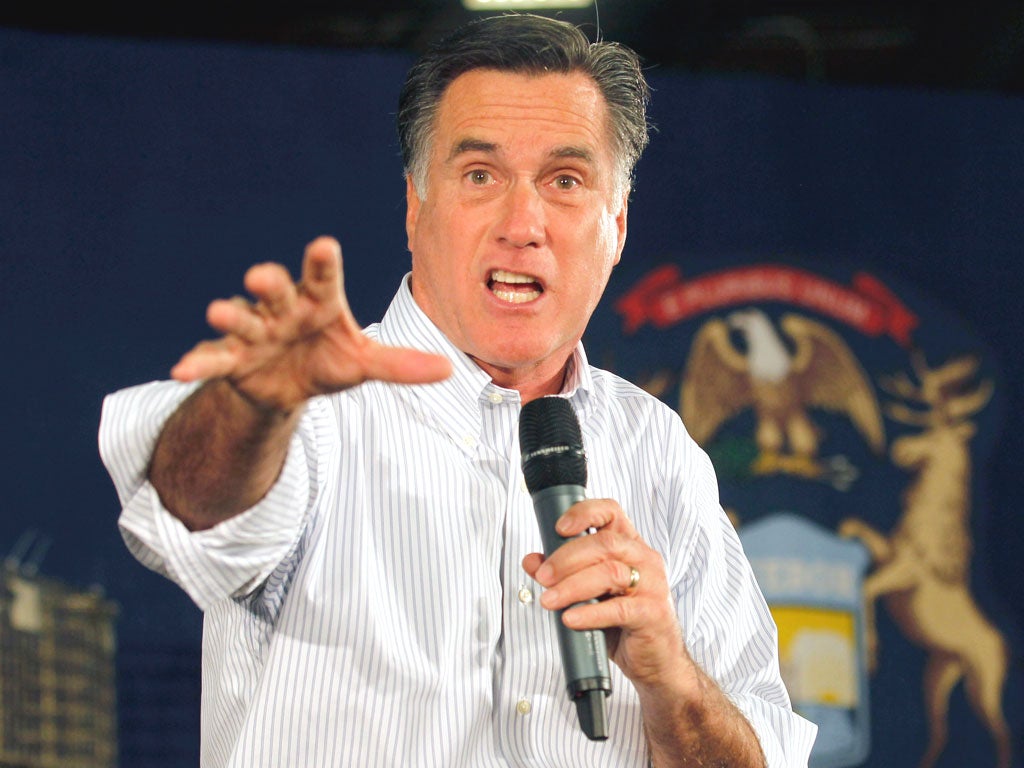Refusal to back Motor City bailout may be a bump in road for Romney

Your support helps us to tell the story
From reproductive rights to climate change to Big Tech, The Independent is on the ground when the story is developing. Whether it's investigating the financials of Elon Musk's pro-Trump PAC or producing our latest documentary, 'The A Word', which shines a light on the American women fighting for reproductive rights, we know how important it is to parse out the facts from the messaging.
At such a critical moment in US history, we need reporters on the ground. Your donation allows us to keep sending journalists to speak to both sides of the story.
The Independent is trusted by Americans across the entire political spectrum. And unlike many other quality news outlets, we choose not to lock Americans out of our reporting and analysis with paywalls. We believe quality journalism should be available to everyone, paid for by those who can afford it.
Your support makes all the difference.As Republican primary voters go to the polls in Michigan today, the US President Barack Obama will be trumpeting the renaissance of the state's auto industry, born of a taxpayer bailout in the depths of the recession which both current Republican front-runners say should never have been approved.
Michigan Democrats sense that, whether it is Mitt Romney or Rick Santorum who emerges on top when polls close, both men have damaged themselves in a critical state in November's presidential election.
Mr Obama says over a million jobs were protected by the government rescue, and Detroit-based General Motors and Chrysler were not only saved from liquidation but recast as stronger, more competitive companies as a result.
For Mr Romney, his opposition to the bailout of Michigan's most important industry is the biggest of several handicaps that has turned the primary from a shoo-in to a contest that he could conceivably lose. The latest polls show him in a statistical dead heat. Mr Santorum also opposed the $85bn in taxpayer loans that kept Detroit afloat in 2008 and 2009, but unlike Mr Romney, his opposition to government intervention in the economy extended to the bailout of Wall Street, which Mr Romney supported.
Last week, the United Autoworkers Union (UAW) parked 26 cars outside a Romney rally so that they spelled out "Let Detroit Go Bankrupt", the headline of an opinion piece he wrote in The New York Times in November 2008.
That was the piece, written in the week that the chief executives of GM and Chrysler went to Congress to plead for taxpayer funds, in which Mr Romney argued no government aid should be forthcoming until the carmakers went through what he called a "managed bankruptcy". President Bush subsequently did give the companies billions of dollars to use as working capital, and the incoming Obama administration continued the taxpayer backing while working on a restructuring.
A failure of just one of the Big Three in Motown would also have been the death of myriad companies that supply the carmakers, says Randy Hoffman, products manager for FabriSteel, which makes the metal fasteners that attach car body parts together. "You might as well have turned the lights off in Michigan," Mr Hoffman says, a car door leaning against a wall in his office.
Like others in the industry he is baffled by Mr Romney's stance and, as a Republican voter, doesn't know what he will do in the general election if he is the nominee. "Now, I couldn't vote for him. I wouldn't even give him the time of day."
The preference for a "managed bankruptcy" – in which the companies' creditors, unions and new private sector backers would have agreed a plan to slim down the companies – is still Mr Romney's position today, which he has been using to mollify the voters of Michigan.
It is a position that has so enraged Steven Rattner, the financier appointed as President Obama's "car czar" in 2009, that the two have been engaged in a duel through editorial columns. There was no private money available to fund the carmakers' operations, Mr Rattner says. The alternative to a bailout was shutting the two companies down.
"I would actually have given Governor Romney a pass on that 2008 piece if he didn't keep repeating it," Mr Rattner told The Independent. "You would have had something over a million people out of work, at least for a while. You would have had cities that were bankrupt. You would have had a state that was effectively, if not officially, bankrupt. You would have had enormous costs loaded on the federal government by the way of unemployment and healthcare and bailing out states that would have almost certainly exceeded what the net cost of this rescue will turn out to be. I cannot think of a single event in business history that I could equate to this and that's part of why people have trouble processing the enormity of the impact that would have occurred."
State profile: Michigan
Voting record: No Republican presidential candidate has won Michigan since 1988 (when George Bush sr triumphed). Bill Clinton took the state in 1992 – and it has stuck by the Democratic nominee ever since. But ahead of November, it could prove crucial for Mitt Romney; his father led Michigan as a popular three-term governor, and a loss in the primary would be a major blow.
Demographics: Catholics make up around 22 per cent of the population.
Big issues: Home to the big three car makers – General Motors, Ford and Chrysler – Michigan has been hit hard by the industrial decline. Mr Romney faces a task convincing voters he cares after opposing a bailout for the auto companies in 2008.
Join our commenting forum
Join thought-provoking conversations, follow other Independent readers and see their replies
Comments